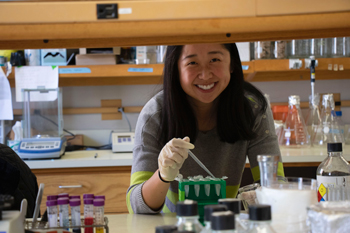SEANET’s Legacy
The impact of interdisciplinary aquaculture research
on Maine

Emma Taccardi, former SEANET student, conducts sea lice research in professor Ian Bricknell’s lab.
ORONO, Maine — The Sustainable Ecological Aquaculture Network (SEANET) was officially completed in January 2020. Since August 2014, the program developed new aquaculture siting tools, discovered new information pertaining to emerging aquaculture sectors, provided suggestions regarding food safety, and continued providing information on aquaculture research outcomes to state officials, stakeholders and community members.
SEANET, funded by the National Science Foundation (NSF) EPSCoR (Established Program to Stimulate Competitive Research) program as a Research Infrastructure Improvement Track 1 project, was the first multiyear effort to research sustainable ecological aquaculture systems (SEASs) as an emerging industry in Maine.
The five-year, $20 million grant was highly collaborative, and facilitated interdisciplinary research projects executed by the University of Maine, in collaboration with the University of New England, Downeast Institute, Maine Maritime Academy, Bowdoin College, St. Joseph’s College, and the University of Southern Maine.
Program outcomes helped inform sustainable aquaculture practices and promote STEM education among the broader public, including diverse and under-reached communities.
Findings, products and outreach that emerged from SEANET related to: aquaculture site selection, sea vegetable aquaculture and food safety, effects of warming ocean temperatures and ocean acidification on species such as lobsters and oysters, potential new and resilient aquaculture species, and the potential impact of aquaculture on Maine’s workforce.
SEANET research has been further developed and absorbed by the Aquaculture Research Institute (ARI) at UMaine. This will allow the legacy of the program to live on through continued interdisciplinary research that builds on SEANET’s findings, while responding to new questions that are sure to be asked as the aquaculture industry continues to expand.
SEANET research and collaborations have played a key role in helping stakeholders and community members better understand how the utilization of sustainable aquaculture may be able to support and benefit the state as a whole.
In addition, SEANET has been a catalyst for future funding and research related to aquaculture and workforce development in Maine.
About the University of Maine
The University of Maine, founded in Orono in 1865, is the state’s land grant, sea grant and space grant university. As Maine’s flagship public university, UMaine has a statewide mission of teaching, research and economic development, and community service. UMaine is the state’s only public research university and among the most comprehensive higher education institutions in the Northeast. It attracts students from all 50 states and more than 70 countries. UMaine currently enrolls 11,561 undergraduate and graduate students who have opportunities to participate in groundbreaking research with world-class scholars. UMaine offers more than 100 degree programs through which students can earn master’s, doctoral or professional science master’s degrees, as well as graduate certificates. The university promotes environmental stewardship, with substantial efforts campuswide to conserve energy, recycle and adhere to green building standards in new construction. For more information about UMaine, visit umaine.edu.
UMaine News, Division of Marketing and Communications, University of Maine, 5703 Alumni Hall, Room 213, Orono, ME 04469-5703.
